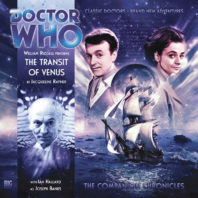
Released January 2009
As much as early Doctor Who succeeded because of the central mystery regarding a strange alien and his granddaughter who had at least a modicum of control over time and space, it wisely knew that a more human element was needed to anchor the audience within the fantastic worlds that were continually presented. With the First Doctor era likewise more of an ensemble piece with the Doctor initially more unwilling to intervene, there is arguably no more important pair of companions in the franchise’s history than Ian Chesterton and Barbara Wright. Returning to the role of Ian for new adventures for the first time since his departure in 1965, William Russell provides powerful narration as Jacqueline Rayner’s ‘The Transit of Venus’ sees the TARDIS land upon Captain James Cook’s Endeavour in the Pacific Ocean of 1770.
Given how difficult balancing four leads is even in longer serials, Rayner wisely and in rather dangerously thrilling fashion writes out Susan and Barbara for the majority of the story in order to allow the often turbulent relationship between the Doctor and Ian to focus as Cook’s crew continues its mission of discovery and naturalist Joseph Banks comes under Ian’s suspicion. Indeed, setting this story directly after ‘The Sensorites’ allows a heightened discord between the two to exist at the start, but the almost begrudging respect they come to show each other with the Doctor at one point even boasting about Ian’s capabilities is an undoubted highlight that hints at the mutual affection and regard they would come to more openly show as their adventures progressed. Understandably, Ian is distressed about the potential loss of Barbara and being fated to spend out the rest of his days in this time period, but the sequence in which he walks in on the Doctor who has a tear in his eye is a masterful bit of characterisation and humanisation for a more cantankerous incarnation of the Time Lord who so deeply cared about Susan, tapping into that early mystery of just who this mysterious figure was and just what Susan and he had truly been through together.
With Ian more directly involved in events due to a hallucinatory story about his origins, he is at first reluctant to meet the renowned captain for fear of the man not living up to the legend, and the risk he carries of further alienating the man with all the power aboard this ship by continuing to chastise and accuse Banks carries very real consequences that lend a further element of danger to the fascinating mystery. Logically, then, it’s the complicated interactions between Banks and Ian that so wonderfully fuel this historical adventure, the extremely pragmatic naturalist’s ideologies a gruff reminder of times past for the more careful and diligent school science teacher. Yet as Banks begins make mention of locations and names he could not possibly know while reciting poems not yet written, discovering the truth behind Banks’s intent and origins becomes Ian’s sole focus, to the point that it nearly costs him his life on multiple occasions. This is a story set in a time when adventures could unfold over the course of weeks and months, and Ian’s simmering but escalating anger as the Doctor repeatedly tosses aside his more audacious theories while staying on the sidelines to study charts is palpable and a definite benefactor of the sprawling nature of the story.
The telepathic element of the plot may be resolved too easily, but ‘The Transit of Venus’ is a wholly authentic recreation of the First Doctor era that succeeds on every front, perhaps packing its most emotional punch when Ian comes to admit just how much he has come to care for Barbara. Aided by William Russell’s immense power and loving interpretation of William Hartness as well as by deft direction from Nigel Fairs that ensures the immense atmosphere, the relationship between the Doctor and Ian, and the mystery surrounding Banks all receive their due exploration, this is yet another sterling example of just how much life this beloved era still has in it after all of these years.
- Release Date: 1/2009


Leave a Reply